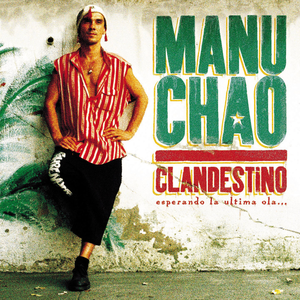Full Wikipedia article: https://en.wikipedia.org/wiki/Manu_Chao
Discography
Clandestino (1998)
Próxima Estación: Esperanza (2001)
Radio Bemba Sound System (2002)
Sibérie m'était contéee (2004)
La Radiolina (2007)
Baionarena (2008)
El Viento
Manu Chao Lyrics
Jump to: Overall Meaning ↴ Line by Line Meaning ↴
Por la frontera
El viento viene, el viento se va
El hambre viene, el hombre se va
Sin más razón
El hambre viene, el hombre se va
Ruta Babylon
Por la carretera
Por la carretera
La suerte viene, la suerte se va
Por la frontera
La suerte viene, la suerte se va
El hambre viene, el hombre se va
Sin más razón
El hambre viene, el hombre se va
¿Cuándo volverá?
Por la carretera
Por la carretera
Por la carretera
Por la carretera
Por la carretera
Por la carretera
In Manu Chao’s song El Viento, he sings about the constant movements of life. “El Viento viene, el Viento se va” which means “The wind comes and goes” is a metaphor for how everything in life is temporary, including the good and the bad. The repetition of this line emphasizes this point further, as the wind may bring good things one day and bad things the next. The following line, “Por la frontera,” which means “Through the border,” suggests that these movements are not necessarily voluntary, but may be forced by political or social circumstances such as immigration, war or poverty.
Throughout the song, Chao highlights the theme of uncertainty and fleetingness that is associated with life. The line “El hambre viene, el hombre se va” which means “Hunger comes, the man leaves,” highlights how easily people in poor communities may be forced to migrate for a better life. The line “¿Cuándo volverá?” which means “When will it come back?” suggests a feeling of uncertainty and longing, questioning whether the good things will return.
The repetition of the line “Por la carretera,” which means “On the road,” further emphasizes the transient nature of life and how movement is a central theme. The road symbolizes the journey of life, where people move from one place to another in search of a better future or a better life. In addition, the use of the word “ruta Babylon” further focuses on the idea of displacement and uncertainty as Babylon is an ancient city that underwent various periods of destruction and displacement.
Line by Line Meaning
El viento viene, el viento se va
Things come and go like the wind
Por la frontera
Across the border, through the frontier
El hambre viene, el hombre se va
Hunger drives people away, without further reason
Sin más razón
Without any other reason
Ruta Babylon
The road to Babylon, a metaphor for a difficult journey
Por la carretera
On the road
La suerte viene, la suerte se va
Luck comes and goes
¿Cuándo volverá?
When will it come back?
Lyrics © O/B/O APRA AMCOS
Written by: Jose Manuel Chao
Lyrics Licensed & Provided by LyricFind

@misterbanjo5594
El viento viene, el viento se va
Por la frontera
El viento viene, el viento se va
El hombre viene, el hombre se va
Sin más razón
El hombre viene, el hombre se va
Ruta Babylon
Por la carretera
La suerte viene, la suerte se va
Por le frontera
La suerte viene, la suerte se va
El hombre viene, el hombre se va
Sin más razón
El hombre viene, el hombre se va
Cuando volver
Por la carretera
@rubysantiago5203
Mi hijo de 4 años es tu Fan
Se está aprendiendo esta canción en el ukelele Grande manu Chao
Saludos de Tijuana.!
@lizbethhernandez-lw2pm
el manu viene, el manu se va, cuando volverás¡! :-) Saluditos desde México
@alehanndroxD
Excelente tema para cerrar este excelente disco.
@mafiamoscoloni2332
HASTASIEMPRE RICARDO🤘🏻
@katherynbejarano6479
Gracias Manu chao te esperamos en Cali COLOMBIA de nuevo ✌🏻
@carmenzaromeroromero1506
El silvar del viento en tu ser. Sinónimo de libertad
@edoardorozza5698
Pstia,,,una de las mejores
@mrblue-jd7ir
Grande manu...te escuxo de cabro y los recuerdos de aquella epoca son con tu musica...saludos manu desde la isla de chiloe...viajando escuchando tu musica llegue a castro
@user-hk8yp7cw1v
yo desde grecia igual
@diogoribeiro7593
Wind is blood